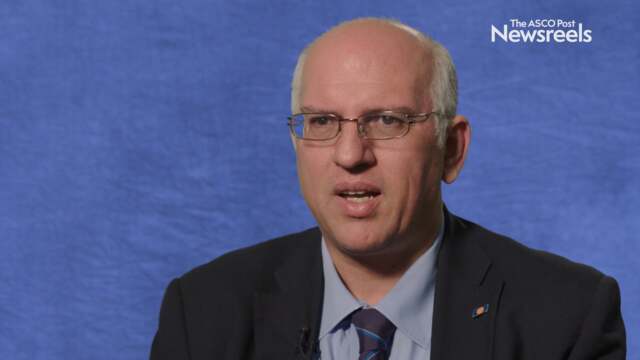Combining Genetic and Sun Exposure Data May Improve Prediction of Skin Cancer Risk
By combining data on individuals’ lifetime sun exposure and their genetics, researchers may be able to generate improved predictions of their risk of skin cancer, according to findings presented by Fontanillas et al at the 2018 American Society of Human Genetics Annual Meeting (Abstract PgmNr ...
Melanoma Research Alliance Appoints Marc Hurlbert, PhD, as Chief Science Officer
The Melanoma Research Alliance (MRA) recently appointed Marc Hurlbert, PhD, as the organization’s Chief Science Officer. Dr. Hurlbert will succeed Louise Perkins, PhD, who will retire form the role after serving MRA for more than 5 years. As Chief Science Officer, Dr. Hurlbert will guide MRA’s...
COMBI-AD Trial: Longer-Term Follow-up of Adjuvant Dabrafenib Plus Trametinib in Resected BRAF V600–Mutant Stage III Melanoma
As reported by Hauschild et al in the Journal of Clinical Oncology, longer-term follow-up of the phase III COMBI-AD trial has confirmed improved relapse-free survival with adjuvant dabrafenib (Tafinlar) plus trametinib (Mekinist) vs placebo in resected BRAF V600–mutant stage III melanoma. In...
ESMO 2018: CheckMate 067: 4-Year Follow-up of Nivolumab Plus Ipilimumab in Advanced Melanoma
As reported in The Lancet Oncology and at the European Society for Medical Oncology 2018 Congress by Hodi et al, the 4-year follow-up of the phase III CheckMate 067 trial has shown a continued overall survival benefit with first-line nivolumab (Opdivo) plus ipilimumab (Yervoy) or nivolumab alone vs ...
Caroline Robert, MD, PhD, on Advanced Melanoma: Research Highlights
Caroline Robert, MD, PhD, of Gustave Roussy Cancer Centre, discusses two high-impact studies in stage III melanoma treatment: an update of the COMBI-AD trial examining dabrafenib and trametinib; and neoadjuvant ipilimumab and nivolumab therapy.
Karl Lewis, MD, on Basal Cell Carcinoma: An Ongoing Study
Karl Lewis, MD, of the University of Colorado, discusses a phase II study of cemiplimab in patients with advanced basal cell carcinoma who experienced progression of disease on, or were intolerant of, prior hedgehog pathway inhibitor therapy.For more information about this ongoing trial, visit clinicaltrials.govClinicalTrials.gov ID: NCT03132636
Jeffrey S. Weber, MD, PhD, on Discontinuing Immunotherapy: When Is the Right Time?
Jeffrey S. Weber, MD, PhD, of the NYU Langone Perlmutter Cancer Center, discusses how long people with melanoma should be treated with PD-1 blockade and the data on remission rates.
Alexander M.M. Eggermont, MD, PhD, on Melanoma: Advances in Adjuvant Therapy
Alexander M.M. Eggermont, MD, PhD, of Gustave Roussy, discusses findings from recent adjuvant trials in high-risk melanoma, and what the NCCN Guidelines recommend in light of such data as results on dabrafenib plus trametinib vs anti–PD-1 treatments (nivolumab or pembrolizumab) and the new standard for wild-type disease.
Paolo A. Ascierto, MD, on Melanoma: Acute and Chronic Toxicities
Paolo A. Ascierto, MD, of Istituto Nazionale Tumori–Fondazione Pascale, discusses the breakthroughs in melanoma treatment and the challenges of managing toxicities, especially endocrine and neurologic side effects, which can require lifetime hormone replacement and may cause permanent dysfunction.
Small Study of Neoadjuvant Combination Checkpoint Blockade in High-Risk Stage III Melanoma
Neoadjuvant combination checkpoint blockade showed activity among patients with high-risk stage III melanoma in a small study. However, a high incidence of side effects caused the trial to be closed early. These results were published by Amaria et al in Nature Medicine. The phase II...
Results From ECHELON-2: Brentuximab Vedotin in CD30-Expressing Peripheral T-Cell Lymphoma
The phase III ECHELON-2 clinical trial has met its primary endpoint, demonstrating a statistically significant improvement in progression-free survival (PFS) with brentuximab vedotin (Adcetris) in combination with CHP (cyclophosphamide, doxorubicin, prednisone) vs CHOP (cyclophosphamide,...
In Vitro and Ex Vivo Activity of Gentian Violet in Cutaneous T-Cell Lymphoma
As reported in JAMA Dermatology, Wu and Wood found that the widely available nonprescription topical antimicrobial agent gentian violet has potent activity against cutaneous T-cell lymphoma (CTCL) in studies in vitro and ex vivo. The study involved high-throughput small molecule screening of 1,710...
Recurrence and Cosmetic Outcomes With Treatments for Primary Basal Cell Carcinoma of the Skin
In a systematic review and meta-analysis reported in Annals of Internal Medicine, Drucker et al found differences in recurrence rates and patient-reported cosmetic outcomes among various treatments for mostly low-risk primary basal cell carcinoma of the skin. Study Details The study involved data ...
FDA Approves Cemiplimab-rwlc for Metastatic Cutaneous Squamous Cell Carcinoma
On September 28, the U.S. Food and Drug Administration (FDA) approved cemiplimab-rwlc (Libtayo) injection for intravenous use for the treatment of patients with metastatic cutaneous squamous cell carcinoma (SCC) or locally advanced cutaneous SCC who are not candidates for curative surgery or...
Overall Survival With Encorafenib Plus Binimetinib vs Vemurafenib in Advanced BRAF-Mutant Melanoma
As reported in The Lancet Oncology by Dummer et al, the phase III COLUMBUS trial has shown a significant improvement in overall survival with the combination of the BRAF inhibitor encorafenib and the MEK inhibitor binimetinib vs vemurafenib in patients with advanced BRAF V600–mutant melanoma. ...
No Improvement in Survival Reported With Epacadostat Plus Pembrolizumab in Advanced Melanoma
IN PATIENTS with unresectable or metastatic melanoma, adding epacadostat to pembrolizumab (Keytruda) did not result in greater clinical benefit over pembrolizumab alone, according to data from the phase III ECHO-301/KEYNOTE-252 study. These results were originally presented at the 2018 ASCO Annual...
Overall Survival Improved With Encorafenib/Binimetinib Combination in BRAF-Mutant Melanoma
IN PATIENTS with advanced BRAF V600–mutant melanoma, combining the BRAF inhibitor encorafenib (Braftovi) with the MEK inhibitor binimetinib (Mektovi) improved overall survival compared to vemurafenib (Zelboraf) or encorafenib as monotherapy, with a favorable toxicity profile, according to updated...
FDA Grants Priority Review to sBLA for Pembrolizumab in Merkel Cell Carcinoma
The U.S. Food and Drug Administration (FDA) has accepted and granted priority review for a new supplemental biologics license application (sBLA) seeking accelerated approval for pembrolizumab (Keytruda) for the treatment of adult and pediatric patients with recurrent locally advanced or metastatic...
Study Examines Link Between Squamous Cell Carcinoma and Recessive Dystrophic Epidermolysis Bullosa
Many patients with the rare skin disease recessive dystrophic epidermolysis bullosa (RDEB)—commonly called butterfly syndrome—also develop squamous cell carcinoma early in life. Now an international team of scientists led by researchers at the Sidney Kimmel Cancer...
Immunotherapy Combination in Melanoma Brain Metastases
In the phase II CheckMate 204 study reported in The New England Journal of Medicine, Tawbi et al found that combined nivolumab (Opdivo) and ipilimumab (Yervoy) produced a high rate of intracranial clinical benefit in patients with melanoma brain metastases. Study Details The study included 94...
Mogamulizumab vs Vorinostat in Previously Treated Cutaneous T-Cell Lymphoma
As reported by Kim and colleagues in The Lancet Oncology, the phase III MAVORIC trial showed that the anti-C-C chemokine receptor 4 (CCR4) monoclonal antibody mogamulizumab (Poteligeo) significantly improved progression-free survival vs vorinostat (Zolinza) among patients with previously treated...
Activity of T Cells in Metastatic Melanoma Resistant to Immune Checkpoint Inhibitor Treatment
In a study reported in the Annals of Oncology, Andersen et al found that tumor-infiltrating lymphocytes isolated from metastatic melanoma lesions in patients with disease progression after checkpoint inhibitor therapy remain functional. Moreover, they concluded these tumor-infiltrating lymphocytes...
Cutaneous Squamous Cell Carcinoma of the Lip and Risk of Nodal Metastasis
In a study reported in JAMA Dermatology, Wang et al found that the risk of nodal metastasis was higher for cutaneous squamous cell carcinoma of the lip with vermilion vs cutaneous location. Disease-specific and overall survival were similar for the two locations. Chrysalyne D. Schmults, MD, of the...
Gene-Expression Predictor for Immunotherapy Response in Melanoma
In a new study, researchers developed a gene expression predictor that can indicate whether melanoma in a specific patient is likely to respond to treatment with immune checkpoint inhibitors. Their research was published by Auslander et al in Nature Medicine. “There is a critical need to be...
Basal Cell Carcinoma and Risk for Development of Other Cancers
Patients who develop frequent cases of basal cell carcinoma appear to be at significantly increased risk for the development of other cancers, according to a study published by Cho et al in JCI Insight. Methods Researchers studied 61 people treated at Stanford Health Care for frequent...
Prognostic Model for Treatment Outcomes in BRAF V600–Mutated Metastatic Melanoma
In a study reported in JAMA Oncology, Hauschild et al identified baseline lactate dehydrogenase (LDH), performance status, disease burden, and gene signature as potential determinants of treatment outcomes in BRAF V600–mutant metastatic melanoma treated with BRAF and/or MEK inhibitors. Study ...
FDA Grants 510(k) Clearance to SRT-100+ Superficial Radiation Therapy for Treating Nonmelanoma Skin Cancer and Keloids
Sensus Healthcare, Inc, a medical device company specializing in the noninvasive treatment of nonmelanoma skin cancers and keloids with image-guided superficial radiation therapy, announced that it has received 510(k) clearance from the U.S. Food and Drug Administration (FDA) to market its new...
Encorafenib Plus Binimetinib in Unresectable or Metastatic Melanoma With BRAF Mutations
In the Clinic provides overviews of novel oncology agents, addressing indications, mechanisms of action, administration recommendations, safety profiles, and other essential information needed for the appropriate clinical use of these drugs. This past June, encorafenib (Braftovi) and binimetinib...
FDA Approves Mogamulizumab-kpkc for Two Rare Types of Non-Hodgkin Lymphoma
Today, the U.S. Food and Drug Administration approved mogamulizumab-kpkc (Poteligeo) injection for intravenous use for the treatment of adult patients with relapsed or refractory mycosis fungoides or Sézary syndrome after at least one prior systemic therapy. This approval provides a new...
Research Finds Failings in Some Apps Used for the Diagnosis of Skin Cancer
In the scramble to bring successful apps for the diagnosis of skin cancer to market, there is a concern that a lack of testing is risking public safety, according to research led by the University of Birmingham. The research, outlined at the British Association of Dermatologists Annual...
Immunosuppressants and Cutaneous Squamous Cell Carcinoma in Organ Transplant Recipients
Research published by Jung et al in OncoImmunology showed organ transplant recipients may reduce their risk of developing secondary skin cancer by changing their immunosuppressant medication. University of Queensland (UQ) researchers have studied the impact of such medications on the immune...
Two Phase III Trials of KX2-391 in Actinic Keratosis Achieve Primary Endpoints
Two phase III studies—KX-AK-003 and KX-AK-004—achieved their primary endpoint of 100% clearance of actinic keratosis lesions at day 57 within the face or scalp treatment areas, with each study achieving statistical significance (P < .0001). Statistical significance (P < .001) ...
Dabrafenib/Trametinib Combination Receives CHMP Recommendation for the Adjuvant Treatment of BRAF V600 Mutation–Positive Melanoma
The Committee for Medicinal Products for Human Use (CHMP) of the European Medicines Agency (EMA) has adopted a positive opinion recommending approval of dabrafenib (Tafinlar) in combination with trametinib (Mekinist) for the adjuvant treatment of adult patients with stage III melanoma...
Indocyanine Green in Sentinel Lymph Node Biopsy for Merkel Cell Carcinoma
High rates of regional lymph node involvement and metastases are not uncommon in Merkel cell carcinoma. National Comprehensive Cancer Network (NCCN) Guidelines recommend sentinel lymph node biopsy (SLNB) for staging purposes in this malignancy. In a study by Knanckstedt et al in ...
Immunotherapy in Merkel Cell Carcinoma: ‘Field Has Been Thrown on Its Head’
At the 2018 ASCO Annual Meeting, investigators presented long-term follow-up data for immunotherapy in patients with Merkel cell carcinoma and new data for its use in the neoadjuvant setting. The results drew high interest from attendees and a number of questions were raised following the...
Human Papillomavirus Vaccine in Cutaneous Basaloid Squamous Cell Carcinomas
Squamous cell carcinoma is the second-most-common form of skin cancer. Evidence suggests the human papillomavirus (HPV) plays a role in the development of some types of this skin cancer. Two years ago, a 97-year-old woman whose right leg was covered with squamous cell tumors went to see...
First-Line Treatment With Checkpoint Inhibitors in Patients With Melanoma Brain Metastases
An analysis of newly diagnosed patients with cutaneous melanoma brain metastases treated with checkpoint blockade immunotherapy has found the treatment was associated with an increase in median overall survival of 12.4 months compared with 5.2 months—a 1.4-fold improvement. The benefit was...
Treatment Beyond Disease Progression in Melanoma: Challenge Centers on Knowing Who May Benefit
Dr. Weiss is Assistant Professor (Medical Oncology), Developmental Therapeutics, Melanoma Program, Yale Cancer Center. Dr. Sznol is Professor of Medicine (Medical Oncology); Co-Director, Cancer Immunology Program, Yale Cancer Center Co-Director, Yale SPORE in Skin Cancer, New Haven, Connecticut. ...
Outcomes in Patients With Melanoma Treated With Anti–PD-1 Antibody Beyond Disease Progression
A POOLED analysis by the U.S. Food and Drug Administration (FDA) has shown a benefit of treatment beyond disease progression on Response Evaluation Criteria in Solid Tumors (RECIST) in some patients receiving anti–programmed cell death protein 1 (anti–PD-1) antibodies for unresectable or...
Expert Point of View: Jedd Wolchok, MD, PhD
“THIS IS a wonderful presentation and a very exciting trial,” said formal discussant Jedd Wolchok, MD, PhD, of Memorial Sloan Kettering Cancer Center, New York. Despite the remarkable advances achieved with anti–programmed cell death protein 1 and ligand 1 (anti–PD-1/anti–PD-L1) treatment, “there...
Early Data Suggest TLR9 Agonist May Combat PD-1 Resistance in Advanced Melanoma
COMBINING CMP-001, a Toll-like receptor 9 (TLR9) agonist, plus pembrolizumab (Keytruda) appears to overcome resistance to anti–programmed cell death protein 1 (anti–PD-1) therapy, according to a preliminary phase Ib study.1 Adding CMP-001 to pembrolizumab was well tolerated, with antitumor efficacy ...
Flight Attendants May Be at Increased Risk of Breast, Skin Cancers
Flight attendants showed an elevated incidence of several types of cancer compared with the general population, according to findings published by McNeely et al in Environmental Health. “Our findings of higher rates of several cancers among flight attendants is striking given the low rates...
FDA Approves Encorafenib and Binimetinib in Combination for Unresectable or Metastatic Melanoma With BRAF Mutations
On June 27, 2018, the U.S. Food and Drug Administration (FDA) approved the combination of the BRAF inhibitor encorafenib (Braftovi) and the MEK inhibitor binimetinib (Mektovi) in patients with advanced BRAF V600–mutant melanoma, as detected by an FDA-approved test.1 Dual targeting of the MAPK...
New Guide Helps Clinicians Navigate Immunotherapy in Merkel Cell Carcinoma
Fred Hutchinson Cancer Research Center researchers have published a new guide to help clinicians navigate a recent revolution in care for advanced Merkel cell carcinoma. The guide was published in JNCCN–Journal of the National Comprehensive Cancer Network, and it accompanies NCCN’s new...
FDA Accepts sBLA for Pembrolizumab as Adjuvant Therapy in Advanced Melanoma
The U.S. Food and Drug Administration (FDA) has accepted for standard review a new supplemental biologics license application (sBLA) for pembrolizumab (Keytruda) as adjuvant therapy in the treatment of patients with resected, high-risk stage III melanoma. The Prescription Drug User Fee Act, or...
Educational Interventions Decrease Sunburns Among Operators of Heavy Equipment
The implementation of educational interventions among heavy equipment operators, or operating engineers, in Michigan significantly increased the use of sunscreen and decreased the number of sunburns, reported Duffy et al in Cancer Epidemiology, Biomarkers & Prevention. “The rates of...
MAGE-A3 Immunotherapeutic as Adjuvant Therapy for MAGE-A3–Positive Stage III Melanoma
In the phase III DERMA trial reported in The Lancet Oncology, Dreno et al found that an adjuvant MAGE-A3 immunotherapeutic provided no benefit vs placebo in patients with resected MAGE-A3–positive stage IIIB or IIIC melanoma. Development of the agent for use in melanoma has been stopped. The ...
FDA Approves Encorafenib and Binimetinib in Combination for Unresectable or Metastatic Melanoma With BRAF Mutations
Today, the U.S. Food and Drug Administration (FDA) approved encorafenib (Braftovi) and binimetinib (Mektovi) in combination for patients with unresectable or metastatic melanoma with a BRAF V600E or V600K mutation, as detected by an FDA-approved test. Approval was based on the randomized,...
The Raven
The call from the dermatologist came at noon on Good Friday, just after my wife left with our two young daughters for a week on her family’s tree farm in Northern Michigan. I was on call for the hospital inpatient leukemia service, so I could not join them. When the dermatologist solemnly began,...
Activity of the PD-1 Inhibitor Cemiplimab in Advanced Cutaneous Squamous Cell Carcinoma
As reported at the 2018 ASCO Annual Meeting (Abstract 9519) and in The New England Journal of Medicine by Migden et al, results of early-phase testing show activity of the programmed cell death protein 1 (PD-1) inhibitor cemiplimab in advanced cutaneous squamous cell carcinoma. Currently, no...





